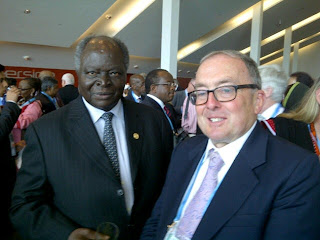I am a great admirer of Barbara Young , and that is not just because she is an ACEVO member! An article in the Guardian is worth reading ; extract below ;
On Barbara Young's office table is a graph. A bar chart, actually: four columns of green, purple, red and bright blue showing the progression, in England, of rates of coronary heart disease, stroke, cancer and diabetes over the past five years. The first two are flatlining or falling. Cancer, in red, is rising, but slowly. Trace a line between the blue bars from 2005 to 2010, and it soars off the chart.
"Diabetes," says Young flatly, "is becoming a crisis. The crisis. It's big, it's scary, it's growing and it's very, very expensive. It's clearly an epidemic, and it could bring the health service to its knees. Something really does need to happen."
Baroness Young is, admittedly, the chief executive of Diabetes UK, Britain's main diabetes charity and campaigning group. It's her job to say such things. But the figures are behind her all the way: diabetes is fast becoming the 21st century's major public-health concern. The condition is now nearly four times as common as all forms of cancer combined, and causes more deaths than breast and prostate cancer combined. Some 2.8m people in the UK have been diagnosed with it; an estimated 850,000 more probably have type 2 diabetes but don't yet know. Another 7m are classified as high-risk of developing type 2; between 40% and 50% of them will go on to develop it. By the year 2025, more than 5m people in this country will have diabetes.
The implications for the NHS, obviously, don't bear thinking about. Diabetes already costs the service around £1m an hour, roughly 10% of its entire budget. That's not just because the condition generally has to be managed with medication or insulin, but because by the time they are diagnosed, around half the people with type 2 – by far the most common and fastest growing form – have developed a longer-term complication.
Cardiovascular disease, for example, will kill 52% of people with type 2 diabetes, who are also twice as likely to have a stroke in the first five years after diagnosis as the population at large. Almost one in three people with the condition will develop kidney disease, and diabetes is the single biggest cause of end-stage kidney failure. You are up to 20 times more likely to go blind if you have diabetes.
"The cost of some of these complications, in terms of medical and social care, unemployment benefits, everything, is just enormous," says Young. "People can't work, can't drive ... And so many personal tragedies. People with diabetes have a foot amputated 70 times a week in England, and 80% of those amputations wouldn't have been necessary if it had been caught earlier and looked after properly."
Recently, Young says, she met a former ballerina. "No one had told her, when she was in her 20s and 30s, that maybe it wasn't such a good idea, might be dangerous even, to keep her blood sugar level deliberately high, for energy. She just had her heel amputated."
Nor is this, of course, a national epidemic. Around the world, some 285m people now have diabetes, a figure expected to climb to 440m within 20 years. In north America, one in five men over 50 have the condition; in India, it's 19% of the population; in parts of the Middle East, 25%. On the tiny Pacific island of Nauru, very nearly one in three people has diabetes. This goes some way to explain why some countries are taking a tough stance on health – Denmark has imposed a "fat tax" of 16 kroner (£1.84) per kilogram (2.2lbs) on saturated fat in a product, while France is adding just over 1p to the price of fizzy drinks (although zero-calorie "diet" versions are – that would contribute to raising the profile of diabetes as "an important and ghastly condition", plus a proper risk-assessment programme. She's not confident of getting the former, because this government doesn't much like big, centralised, top-down initiatives. On the latter, she says, the NHS has something called a Vascular Health Check, which people over 40 should be getting, "except most of us haven't heard of it. We screen for cervical cancer, heart disease, high blood pressure. The stroke programme's completely revamped. But diabetes is now a much bigger problem than stroke. A vascular check would help pick it up, and it's not working."
Diabetes UK has drawn up a 15-point list to help ensure everyone diagnosed with diabetes gets the care they need, including checks on blood sugar levels, blood pressure, cholesterol, eyes, feet and kidneys. "We want 2.8m people up on their hind legs, demanding they get the right care," says Young. "That has to change. Plus there are big variations in care regionally."
So good luck Barbara Young and Diabetes uk. Yet another reason why the NHS needs reform. Moving resources from acute to community care. This issue is simply not being addressed. Witness the poor quality of debate in the Lords on the Health Bill. This is the sort of issue they should be focusing on.














































